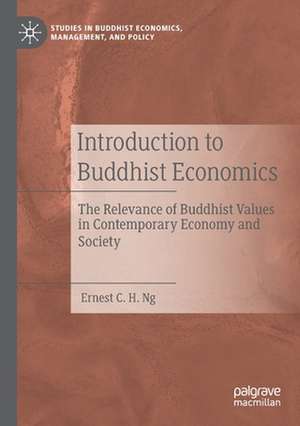Introduction to Buddhist Economics: The Relevance of Buddhist Values in Contemporary Economy and Society: Studies in Buddhist Economics, Management, and Policy
Autor Ernest C. H. Ngen Limba Engleză Paperback – 31 ian 2021
| Toate formatele și edițiile | Preț | Express |
|---|---|---|
| Paperback (1) | 578.87 lei 6-8 săpt. | |
| Springer International Publishing – 31 ian 2021 | 578.87 lei 6-8 săpt. | |
| Hardback (1) | 584.10 lei 6-8 săpt. | |
| Springer International Publishing – 31 ian 2020 | 584.10 lei 6-8 săpt. |
Preț: 578.87 lei
Preț vechi: 681.02 lei
-15% Nou
Puncte Express: 868
Preț estimativ în valută:
110.77€ • 116.04$ • 91.80£
110.77€ • 116.04$ • 91.80£
Carte tipărită la comandă
Livrare economică 09-23 aprilie
Preluare comenzi: 021 569.72.76
Specificații
ISBN-13: 9783030351168
ISBN-10: 3030351165
Pagini: 201
Ilustrații: XXIII, 201 p. 13 illus.
Dimensiuni: 148 x 210 mm
Greutate: 0.28 kg
Ediția:1st ed. 2020
Editura: Springer International Publishing
Colecția Palgrave Macmillan
Seria Studies in Buddhist Economics, Management, and Policy
Locul publicării:Cham, Switzerland
ISBN-10: 3030351165
Pagini: 201
Ilustrații: XXIII, 201 p. 13 illus.
Dimensiuni: 148 x 210 mm
Greutate: 0.28 kg
Ediția:1st ed. 2020
Editura: Springer International Publishing
Colecția Palgrave Macmillan
Seria Studies in Buddhist Economics, Management, and Policy
Locul publicării:Cham, Switzerland
Cuprins
1. What is Buddhist Economics?.- 2. The Four Noble Truths: A Decision-Making and Problem-Solving Framework.- 3. What is the Problem with the Market Economy?.- 4. Drivers behind the Shortcomings of the Market Economy.- 5. Buddhist Economics Theory.- 6. Buddhist Ethics and Moral Life.- 7. Buddhist Wisdom and Defining Principles.- 8. Interconnectedness, Competition, and Collaboration.- 9. Envisioning a Different "Growth Model".- 10. Alternatives to Profit-Driven Economic Growth Models.- 11. Making Sustainable Decisions in Daily Life.- 12. Implications for Business, and for Social and Environmental Change.
Notă biografică
Ernest C. H. Ng is Adjunct Assistant Professor at the Centre of Buddhist Studies at the University of Hong Kong, China, where he teaches an undergraduate course on Buddhism and Economics. His research interests include Buddhist economics, the intersection of spirituality and materiality, sustainable decision-making and mindfulness. He is currently the Chief Executive Officer at Tung Lin Kok Yuen, a Buddhist NGO with over 80 years of history dedicated to Buddhist teachings, education, and community services in Hong Kong. Prior to that he was the Chief Investment Officer at Sumeru Capital and a Vice President at Morgan Stanley's Principal Strategies team with over 15 years of experience in investment banking and asset management.
Textul de pe ultima copertă
Living in a market-driven economy where short-term profit and economic growth appear to be the ultimate goal, this book explores how Buddhist teachings could bridge the divide between our spiritual and material needs and reconcile the tension between doing good for social interest and doing well for financial success. This book serves as a pioneering effort to systematically introduce Buddhist Economics as an interdisciplinary subject to audience with limited background in either Buddhism or economics. It elaborates some core concepts in Buddhist teachings, their relevance to economics, and means of achieving sustainability for individuals, society and the environment with the cultivation of ethical living and well-being. Through scholarly research from relevant fields including Buddhist studies, economics, behavioral finance, cognitive science, and psychology, this book illustrates the relevance of Buddhist values in the contemporary economy and society, as well as the efficacy of Buddhist perspectives on decision-making in daily life.
Caracteristici
Introduces Buddhist Economics as an interdisciplinary subject at the fundamental level to audience with limited background in the field of either Buddhism or economics Illustrates some core concepts in Buddhist teachings, their relevancy to economy and society, and means of achieving sustainability for individuals, society and the environment through the cultivation of ethical living and well-being Presents and analyzes the relevance of Buddhist spirituality for ethical and sustainable economy in the contemporary context by drawing reference to a wide range of scholarly research from the fields of Buddhist studies, economics, behavioral finance, cognitive science, and psychology


